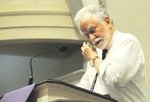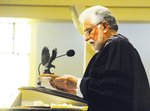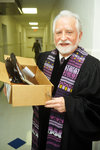





CHAPEL HILL — Sunlight streamed through the aged stained-glass windows on a recent Sunday as University Baptist Church members, and their pastor Dr. Mitch Simpson, prepared for the final service under his leadership.
It was a bittersweet occasion, with tears, laughter and many stories shared about Simpson’s 47-year ministry.
The spirit of the community and sense of togetherness was evident among the pews of the church as members of the congregation blended with friends from all five churches where Dr. Simpson has preached and his years in the pulpit came together under the roof of the nearly 100-year-old building on South Columbia Street downtown.
Despite his 47 years as a minister, the last 30 of them at the church in Chapel Hill, Simpson didn’t always plan to be in the pulpit.
“I suppose I sort of backed into it,” Simpson said. “By the time I was in 8th grade I had decided I would not be available. Look, you couldn’t pay me enough to be in ministry. I had no intention of being in ministry.”
Yet, ministry was in his family. His dad was a pastor, and the family moved to Siler City in 1958. He pastored two churches at the same time, and then a woman in the church, Blanche Brooks, donated a church for missions. With several members of their congregation, they came together to create a new church.
As a young boy growing into adulthood, Simpson spent his formative years in Siler City.
“Siler City comes about as close to being a hometown as I ever had. We moved around as pastor’s families do,” Simpson said. “But, from the third grade on, Siler City was my home, and I love that. I love my memories of it.” Simpson graduated from Jordan-Matthews High School in 1968, when they were known as the Blue Phantoms.
“I think about some of the wonderful people, and some of those churches in Siler City who touched my life, just with kindness,” he said. “I don’t remember any one Sunday school lesson that any of those good country people taught me, but I remember that they loved me and they cared about me and they cooked good food and gave it to us.”
While in the area, Simpson met retired actress Francis Bavier, also known as Aunt Bee, from “The Andy Griffith Show.”
“I got to meet her, I sat and talked, and visited her, and invited her to go to Brookdale Baptist Church with my mom,” he said.
The pair stayed in contact over the years through letters as Simpson studied in California and England.
“I treasure a photograph that I have of the two of us together,” he said of a picture taken of him and the late actress, who spent her retirement years as a Siler City resident.
Despite his early reluctance, eventually Simpson realized that he couldn’t run away from the Lord, or His calling.
His favorite poem, “The Hound of Heaven” by Francis Thompson, gives an idea of Simpson’s struggle with God before finally deciding to follow His guidance. He realized that he couldn’t run away from God. The poem is about a man who runs from doing the things God wants him to do.
“I fled him, down the nights and down the days… I hid from Him, and under running laughter,” the poem reads.
“It describes God’s love like a great loving beast, no matter how much we run,” Simpson said. “God’s love is a pursuing love. It pursues us, it won’t let us go. The point is I ended up going to divinity school.”
Completing studies at Cambridge University, and a Doctorate in Humanities at Florida State, prepared him for his role as a minister of the Gospel.
Now, after 47 years, Simpson is looking back on a career in both Florida and North Carolina that helped those with the many needs that a pastor sees every day.
The pews of University Baptist Church were full of members and stories of the church on March 1, his final Sunday.
“I’m here to celebrate. I loved him. When we came to the church, we felt immediately welcome, and part of the family,” Deanna Dale said. “This is a well-deserved retirement. I wish him the best in whatever chapter is next.”
Zoilene Reissner, part of the church’s handbell choir, had arranged the song “Travelers on a Journey” as a special tribute to be played on his final day as pastor.
“I’ve been a member for six years,” Reissner said. “There’s so much love in every heart, and great crowds of people. They’re so full of love or they wouldn’t be here. Mitch has a heart for all people. He loves the way God loves.”
Melissa and Tim Pendry shared their thoughts about Dr. Simpson and his kindness toward their son.
“Our oldest son [Brandon] was a youth minister, and he was mentored by Mitch to go into ministry,” said Melissa. “We became connected to the church because of our son. We love him and Betty [Simpson’s wife]. They mean the world to us. He’s a great deliverer of the message.”
”He is as he seems,” Tim said about him. “That’s the highest compliment I can give a human being.”
Jo McCall remembered the time that Simpson brought a milkshake to her in the hospital after the birth of her child. It’s something that he’s done for every new mother at the church over the years. It’s one of the ways that Simpson shows his love to the congregation.
Other ministries under his guidance include a prison ministry. The friend of a woman’s husband who had been sent to prison was the inspiration.
“They begin to visit in prison, which you begin to see how lonely these people are,” Simpson recalled. “They didn’t need somebody coming in with a Bible or a little tract to hit them over the head with that, ‘you love Jesus,’ you know, they needed somebody to come and talk to him.”
There are ministries to the sick, the poor, to those who have never been to church but found some message in his words that made a difference. He’s worked a lot with people from Myanmar, persecuted for their Christian religious beliefs in a state of China.
“They had to leave because of religious and political persecution. Many took a circuitous route to get here, through Malaysia and otherwise, and they are my heroes, most of whom were already persons of faith,” Simpson said. “When the government declared that that faith, Christianity, was not welcome they had to flee, apparently. They would have been imprisoned or worse had they stayed.”
Simpson explained his philosophy of the love of God.
“What I’ve tried to do, I just think that we are very fortunate, as I have been, if we can love people, and one at time, try to show people that there is nothing we can do that can separate us from the love of God,” he said. “They don’t have to earn it, don’t have to recite a silly little creed, or recite four steps of spiritual laws or any of those things. Those are silly things made up by human beings.”
Simpson also has strong feelings about what is happening in churches in this era.
“A lot of churches I know, people are more familiar with the constitution and bylaws of the church and ‘Roberts Rules of Order,’ than they are with the New Testament. We have created a religious business called church. We have worship services that concentrate on making us feel good. Show me a large gathering of what passes for worship nowadays and I’ll show you something that’s barely more than entertainment. I’m reminded of the lyrics of a country song by Don Williams, ‘I don’t believe that heaven waits for only those who congregate.’ This points to the fact that the religiosity, the false sort of piety of a lot of congregations, is bogus.”
Hence, Simpson’s poor view of the church of today is all about what is missing in the church.
“I would have to say that much of what passes for Christianity in the church is and has always been almost totally unrelated to the actual person of Jesus of Nazareth,” he said. “Jesus and his ragtag disciples and his absolute love of all people of all inclinations, all genders, fluid identities, was and would continue to be unwelcome in most congregations.”
The efforts of Simpson’s ministry, therefore, have been to be all-inclusive and welcoming to those in need. In his last service as pastor, and the retirement celebration following lunch, Simpson was moved to tears several times by the support, kind words, and memories shared from his ministries at five churches. His 30-year experience with University Baptist Church was the main focus of the day. Part of the celebration at the church was an award from North Carolina Governor Roy Cooper, “The Order of the Long-Leaf Pine.”
“His personal motto, ‘Speak the truth to power’, helps others to speak out,” State Representative Verla Insko said when giving the award to Simpson. “He’s gifted, and loves learning. He was inspired by the state motto.”
The state motto, Esse quam videri, is a Latin phrase that means, “To be, rather than to seem.” The idea is to truly be something, in this case, a minister of the Gospel, rather than just an image.
Simpson said that he wants the award in his casket.
“It was wonderful that people came, people from the past 30 years,” he said. “Students here, people who have been helped, street people, and people that just across the whole planet to be of the cultural landscape. They came not as a tribute to this pastor, but as a witness to the risen Spirit of Jesus. [He is] all compassionate, all embracing, and all forgiving that they experience that somehow, and that touched my heart, that just touched my heart. That’s really...what I’ve been about my whole pastorate.”
Looking into the future for the membership of his church, Simpson first looked back into the past.
“It’s more a sense that the trajectory of this congregation over the past 30 years has really moved so beautifully, toward a new voice from the family of Christian fellowship,” he said. “The voice says that it’s sense of mission, its openness to all people of all colors, all persuasions, all backgrounds, and wide ranging theologies.
“We have made great progress in becoming what the church should look like, and where a strong sense of spirit was allowing us to be more and more creative in our ministries and outreach and so, no one needs to stay in a place simply because they can. It’s not easy for our congregation for me to step away, we love them as much as we ever have, and they us,” Simpson said. “I also know it’s a good time for good creative leadership, for a man or a woman, who will come into this situation as I did in 1990 and bring a new perspective. I would never have guessed in 1990 that I would serve here for 30 years.”
Simpson had thoughts for those that feel that God is calling them to the ministry.
“Anybody who’s considering a call to ministry, be sure that it’s God calling you and not your grandmother. It’s not sweet. It’s terrifying, it’s wonderful. It’s just the highest calling there is but it is not sweet,” he said. “If God wants you in a particular vocational ministry, He will let you know. But don’t be deciding that in the 8th grade, because you think it’s power or authority. The only authority a minister has is to die on the cross. Especially at times of heartache, darkness and fear, and by being there at times like that the pastor earns the privilege to stand before them, at the appointed time. Every pastor and person is deeply flawed, and amazingly Gods grace can work through us and reach out to another deeply flawed person.
In his time as a minister, there have been moments of sorrow, and times of joy.
“[For me] seeing people step out of fear and darkness and a sense of unworthiness and realize, some for the first time, that God loves them no matter what,” Simpson said. “God does not make mistakes. That they are worth loving, and whatever mistakes they have made, God’s pursuing love keeps coming after them, through other people, especially those that seem the least likely.”
Simpson boiled down his message in a simple, straightforward way.
“It does not matter, to what God calls you,” he said, “we are all called to take up the cross as a symbol of God’s sacrificing love and follow. There’s only one message and that is, God loves you. Jesus is Lord, just follow Him.”